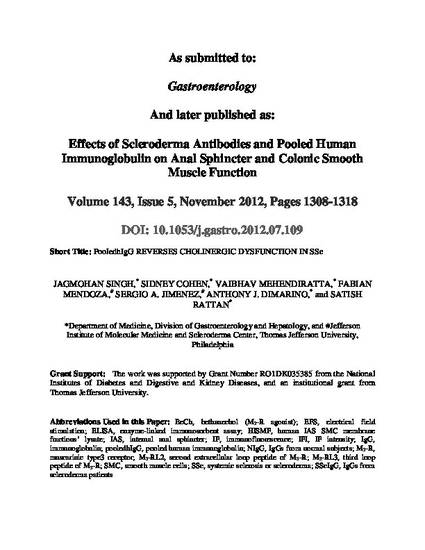
BACKGROUND & AIMS: Patients with systemic sclerosis (SSc) have impairments in gastrointestinal smooth muscle function. The disorder has been associated with circulating antibodies to cholinergic muscarinic the type-3 receptor (M(3)-R). We investigated whether it is possible to neutralize these antibodies with pooled human IgGs (pooledhIgG).
METHODS: We studied the effects of IgGs purified from patients with SSc (SScIgGs) on cholinergic nerve stimulation in rat colon tissues. We also examined the effects of SScIgGs on M(3)-R activation by bethanechol (BeCh), M(3)-R occupancy, and receptor binding using immunofluorescence, immunoblot, and enzyme-linked immunosorbent analyses of human internal anal sphincter (IAS) smooth muscle cells, before and after administration of pooledhIgG. Functional displacement of M(3)-R occupancy by the SScIgGs was compared with that of other IgGs during the sustained phase of BeCh-induced contraction of intact smooth muscles from rats.
RESULTS: SScIgG significantly attenuated neurally mediated contraction and acetylcholine release in rat colon as well as BeCh-induced sustained contraction of the IAS smooth muscle. In immunofluorescence analysis, SScIgG co-localized with M(3)-R. In immunoblot and enzyme-linked immunosorbent analyses, M(3)-R loop-2 peptide and human IAS SMC membrane lysates bound significant amounts of SScIgG, compared with IgGs from healthy individuals and pooledhIgG. Binding was attenuated significantly by application of pooledhIgG, which by itself had no significant effect. Incubation of samples with pooledhIgG, or mixing pooledhIgG with SScIgG before administration to tissues, significantly reduced binding of SScIgG, indicating that pooledhIgG prevents SScIgG blockade of M(3)-R.
CONCLUSIONS: In studies of rat and human tissues, pooled human IgG prevent and reverses the cholinergic dysfunction associated with the progressive gastrointestinal manifestations of SSc by neutralizing functional M(3)-R antibodies present in the circulation of patients with SSc.
Available at: http://works.bepress.com/vaibhav_mehendiratta/7/

This article has been peer reviewed. It is the authors' final version prior to publication in Gastroenterology
Volume 143, Issue 5, November 2012, Pages 1308-1318.
The published version is available at DOI: 10.1053/j.gastro.2012.07.109. Copyright © Elsevier Inc.